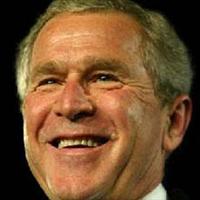 Tough-sounding address makes no mention of Iraq
Tough-sounding address makes no mention of Iraq
By George E. Condon Jr.
WASHINGTON President Bush delivered one of the more muscular, foreign-policy-dominated inaugural addresses in recent American history, using the speech to put leaders overseas on notice that he will be aggressive about spreading democracy and promoting human rights during his second term.
But with the nation embroiled in an increasingly unpopular war, he did not talk specifically about it, declining to mention the word “Iraq.”
While the war’s costs mount, the president pointedly did not ask the country for sacrifices to win the victory he promises. All he asked for was more patience.
In a country still divided over the Bush presidency and Iraq, Bush said little about healing in his speech yesterday.
For Bush partisans, however, there was everything they love high-sounding proclamations of fealty to global democracy and spreading Western-style freedom and tough-sounding promises to use “force of arms when necessary” to protect U.S. interests.
Just as much as the unprecedented security measures that clamped a tight lid on 100 blocks in the nation’s capital, the address left no doubt about how much the priorities of the nation and the world have changed since Bush gave up the Texas governorship four years ago to seize the reins of power in Washington.
“Even the way he took the oath of office today was different he sort of barked it out this time. He was more assertive, more confident,” said Wayne Fields, a professor at Washington University in St. Louis who has closely studied inaugural and State of the Union addresses.
“In his first inaugural, we were not talking about changing the world. We weren’t talking about national security in the same way. Today, we saw the change in the times,” Fields said.
Stephen Hess, former speechwriter for Dwight Eisenhower and Richard Nixon, called this address “a mirror image” of Bush’s 2001 speech.
“The themes were still there, but the balance had changed,” he said. “This was two-thirds foreign policy, one-third domestic. The first one was the opposite. This was, very decidedly, a 9/11 speech.”
Hess called it “a very American speech” in the tradition of past inaugural addresses.
“There was the deference to God that goes back to George Washington. There was America as a chosen country that is Jeffersonian. There was a sense of unity and wisdom of the people that comes out of Lincoln. There was the robust nature of interceding around the world, which is Theodore Roosevelt. There was Reagan’s sense of tolerance,” he said.
Bush is the fourth U.S. president to deliver his second inaugural address in a time of war. The three others James Madison, Abraham Lincoln and Nixon let the wars dominate their addresses.
So it was surprising that Bush did not mention Iraq since the war’s outcome almost certainly will determine his standing in history. But Fields said it was wise to exclude Iraq from the address.
“This is a moment when you’re trying to draw people back together,” he said. “You tend to stress large, abstract notions that we’re all committed to like freedom and liberty.”
The president’s emphasis on leading a global campaign for freedom and democracy immediately sent shudders through some foreign capitals, particularly his statement that “fortunately for the oppressed, America’s influence is considerable, and we will use it confidently in freedom’s cause.”
The contrast is stark with what Nixon said in his Vietnam War-influenced address in 1973: “The time has passed when America will make every other nation’s conflict our own, or make every other nation’s future our responsibility, or presume to tell other nations how to manage their own affairs.”
“We’ve come full circle,” said Georgetown University government professor Steve Wayne. “Here we have a Republican president who opposed using the military as nation-builders in 2000 and now sees American diplomatic, military and economic force as powerful weapons in the war for freedom.”
Hess cautioned critics not to expect U.S. interventions in North Korea, Iran or other Middle East nations to flow from yesterday’s rhetoric, though.
“You could see those words and say, ‘Watch out, North Korea,’ and ‘Watch out, Iran.’ And yet we know that’s not going to happen,” Hess said.
“Presidents say things and even believe things but there are some things they can’t do. This is a president who realistically isn’t going to start a third war. We already have two going at the moment,” referring to Iraq and Afghanistan.
In the end, what is usually remembered from an inaugural address is its tone. And Bush’s was confident and assertive.
“There was nothing humble in this speech,” Fields said. “The American people seem to prefer confidence and assurance to any show of humility at this point in time even if they don’t understand quite what the basis for that confidence is.”
Left to a later date and a later speech will be a fuller description of Bush’s road map for the United States’ eventual exit from Iraq.
ATTENTION READERS
We See The World From All Sides and Want YOU To Be Fully InformedIn fact, intentional disinformation is a disgraceful scourge in media today. So to assuage any possible errant incorrect information posted herein, we strongly encourage you to seek corroboration from other non-VT sources before forming an educated opinion.
About VT - Policies & Disclosures - Comment Policy



